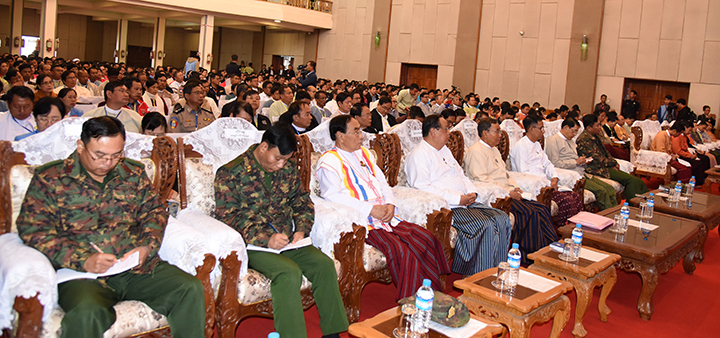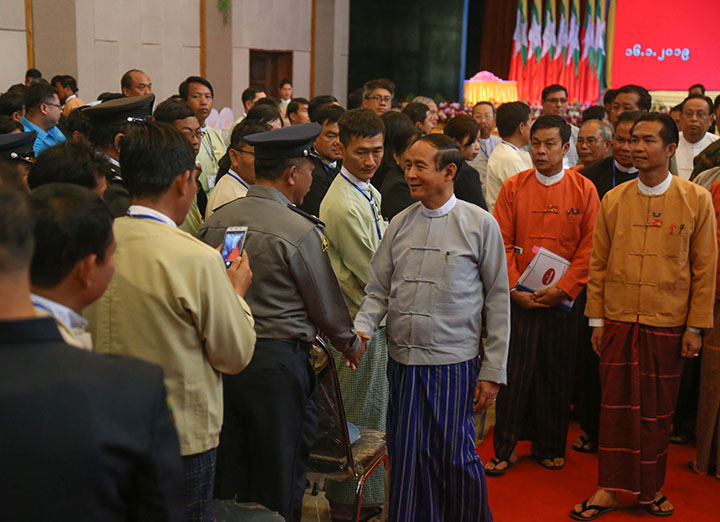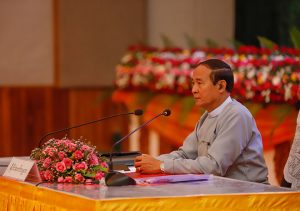17 January
President U Win Myint attended the meeting with officials from the executive, legislative, and judiciary pillars of Kayah State held in Loikaw Township yesterday morning.
Accompanying the President were Union Ministers Lt-Gen Kyaw Swe, U Min Thu, Dr. Aung Thu, U Ohn Win, U Win Khaing, and Nai Thet Lwin, and other officials. Present at the meeting were the Kayah State cabinet, officials from the State Hluttaw and High Court, Hluttaw MPs (Pyithu, Amyotha, Kayah State), and officials from state, district and township level departments.

In his opening speech, the President said he has been traveling to the states and regions urging democratic transition and national reform to be carried out uniformly. He said that Myanmar was transitioning from an old system to a new and modern system, and that this required the people to break out of their old habits and onto new paths. He said every responsible official needed to cooperate to reach the intended goal. He said a firm resolution has been set to establish a ‘democratic federal union’. He said all citizens in a democratic country enjoyed equality, justice, fairness, and the same rights and opportunities. He said Myanmar comprised many ethnic national races and cannot be called a Union without all of them included. He said this was why he made the resolution to establish a democratic federal union.
The President said some people may be hesitant, worried or feel burdened to change. He said the unchanging truth of the world is that change is constant. Both living and non-living beings change with time, said the President. He said adapting with change is the key to survival. He said the changes being made intend to strengthen the democratic foundation of the nation and its people. He said just changing the entire cabinet of the Union or state and regional government cannot be called a democratic transition nor will it result in a change in the administrative mechanism. He said change will only occur when the officials and staff from the grassroots departments implement the changing policies of the nation.
The President said everyone in a department must work hand-in-hand to bring about successful change. He added we must shed our old habits to instill change in the nation and the people. We need to gauge how much we have changed ourselves when implementing changes, as we can only change other people when we succeed in changing ourselves. Therefore, the heads of departments needed to guide and amend change in spirit and habits of the staff under their care. Change was neither worrying nor fearful. Everyone needed to actively participate with their own thoughts and reasoning, said the President.
The President said everyone in a department must work hand-in-hand to bring about successful change. He added we must shed our old habits to instill change in the nation and the people. We need to gauge how much we have changed ourselves when implementing changes, as we can only change other people when we succeed in changing ourselves. Therefore, the heads of departments needed to guide and amend change in spirit and habits of the staff under their care. Change was neither worrying nor fearful. Everyone needed to actively participate with their own thoughts and reasoning, said the President.
The President said the intention was to head towards an administration where all citizens do not worry about prestige, riches or pride and implement fairness in society, business, and politics. There must also be equality in opportunities, class, and before the law. No one was above the law and must be in accordance with the law. This would ensure the country was a democratic country. There must be responsibility and accountability in a democracy. Democracy meant abiding by the rules and the law. This was a fundamental pillar of democracy, said the President.
He continued to say that everyone here in attendance must be able to work harder then everyone else, and must endure and sacrifice more as well. Officials must accomplish the tasks entrusted by the people. They must repay in diligent work to the people. The administration we are heading towards must be fair and supportive of the rule of law. It must be averted from becoming an oppressive administration. The mechanism must be service-oriented and citizen-based.
The legislation pillar has a responsibility to serve the country abiding by the rules and regulations of the enacted laws, and directives and instructions. Only then, the administrative, legislative and judiciary pillars could interact to ensure check and balance. To achieve success in implementing works, all should have an attitude of magnanimity, tolerance and forgiveness mutually and all should embrace welfare of others before self, said the President.

He also urged the attendees from the governmental departments to give correct information to their superior bodies to be able to make right decisions, stressing the need to complete the works at the state/region level in conformity with the region/state level laws.
The Judiciary pillar was an important pillar for democracy, and only when this pillar can work in a right way with legal norms and standards, the rule of law will prevail in the country, he said. All those who were working in the judiciary pillar should observe the law concerning with the legal system because only when the judiciary pillar is right, can the society ensure fairness and justice.
A fair and just society strengthens a democracy and can be supportive to a federal system, said President U Win Myint.
He called on the governmental officials for solving the problems faced by the people daily first rather than their own, urging the officials to actively participate in implementing the State policies.
Afterwards, Kayah State Chief Minister U L Phaung Sho reported on regional development works by the Kayah State Government; Speaker of Kayah State Hluttaw U Hla Htwe on Hluttaw affairs and Kayah State Chief Judge U Kyaw Lin Maung on judiciary affairs.
Afterwards, President U Win Myint made his concluding remarks, urging the courts to settle the cases quickly and fairly not to cause grievances in education and socio economy of those who were on trial.

As the judiciary system was independent, the administrative and legislation pillars are not to interfere in it, and judges at different levels were to take responsibility and accountability.
Regarding the drug issues, the President urged the governmental departments neither involve in the crime nor turn a blind eye to the drug trafficking cases, stressing the need to arrest the main source of the drug trafficking.
Regarding the legislative sector, the President urged to enact laws which could benefit the state, saying that only when the capacity of MPs and service personnel were high, could the legislative pillar be developed.
The three pillars should work in a check and balance way avoiding competition, said President U Win Myint, adding that a good government should ensure accountability, responsibility, transparency, calculation and cooperation.
A bad management of a region or state government could cause hindrances to the democratic transition and all citizens need to participate in building a federal democratic nation as the country was in a transition to democracy.
Following the meeting, President U Win Myint and entourage visited the Taungkwe Pagoda and Myo Nam Pagoda in Loikaw and made cash donation there.
Afterwards, the President and his entourage returned to Nay Pyi Taw by a Special flight of the Tatmadaw.
—MNA
(Translated by Zaw Htet Oo)



